- Home
- Chuck Wendig
Thunderbird Page 12
Thunderbird Read online
Page 12
Miriam’s hand reaches. Her fingers curl underneath.
She’s gonna dash his brains all over this tent.
Gabby puts a hand on her arm. She says to Miriam, “Let’s just get out of here. No trouble. Okay?”
The sheer potential for violence crackles off Miriam like supercharged static electricity— just seconds before the sharp snap of shock.
The plea shines in Gabby’s eyes.
Miriam gives her a small nod.
“Let’s go, girls, come on, come on, Jesus.” Meatsack waves them on, lifting the tent flap. Miriam ducks underneath but pauses next to him.
“What’s your name, soldier?”
“Jade.”
“Jade and Janice. Janice your girl?”
“Janice is my mom. Now fuckin’ move.”
Miriam bares her teeth in something resembling a smile.
And, like the man says, she moves.
THIRTY-ONE
BREAKING BREAD
They don’t go through the house. Meatsack Jade ushers them around the side, past a couple rusted rain barrels, past stacks of crates, to a patio out back underneath an off-kilter pergola. In the far distance, the last light of day doesn’t fade so much as it’s shoved down below the horizon by the great expanse of nighttime sky: an infinity of stars flung across the uneven black like glitter.
He indicates the table and chairs— a couple of picnic tables shoved together, joined by a red-checkered tablecloth and surrounded by a mismatched set of white plastic patio chairs.
Miriam and Gabby share a look.
Jade goes behind them— there’s the familiar sound of a Zippo lighter clinking. Then the crackle of flame to paper. Miriam turns, see him throw a wad of newspaper— a tongue of flame dancing off it— into a rusted barrel.
Whatever’s inside catches fire fast. The smell of lighter fluid hits her nose before vanishing. Smoke rises from the barrel like desert ghosts.
Miriam shrugs, pulls out a chair for Gabby, then one for herself.
Let’s just get out of here. No trouble, okay?
A small, and possibly impossible, promise, Miriam thinks. Part of her wants to get this over with and get the hell out. The other part of her? She wants to know how it’s all connected. Because some strange, hard-to-see thread ties this all together: the woman, Gracie; her son, Isaiah; Mary Scissors; the explosion and gunmen at the courthouse. Miriam’s feeling for a rope in the dark. Something, anything to help guide her through this moonless maze.
Her fingers rattle an impatient drumbeat. There’s a flicker of movement close to her—
Thunk!
A combat knife slams down two inches from her hand. She recoils, reeling in her grip lest she lose a pinky.
Jade frees the knife, tilts it toward her.
A tiny scorpion twists at the end of the blade, the knife tip stuck through its middle. Meatsack leers, grinning. “It’s the little ones you gotta worry about. The smaller the scorpion, the deadlier the venom.”
He pinches it, plucks it, and flings it over his shoulder. Laughing.
“Thanks,” she says.
“All kinds of shit out here will kill ya. Black widows. Rattlesnakes. Killer bees. Gila monsters.” He leans in close. She can smell his breath: rank, like rotten food stuck between his teeth. “I hear tell even vultures can end you.”
She sniffs. “You know? I’ve heard that very thing. But you know what else I hear? That no animal is deadlier than man. Am I right?”
“Hand to God,” he says, and chuckles. “Hand. To. God.”
Sounds like he’s about to say more, but there’s movement inside the house— and, half a second later, a sliding glass door opens. Out comes Ofelia, carrying a long plate covered by tented foil. Steam escapes and the smell of good food is like a fishhook in Miriam’s mouth. Ofelia stares daggers, then sets the plate down. She goes back inside, passing a young man coming out: he’s got a boyish, maybe even girlish figure, and he walks like a puma pacing its cage.
He sets down a pitcher of lemonade. With arched eyebrows and an exaggerated, almost cartoonish sneer, he surveys Miriam and Gabby. “Lemonade,” he says. “Need glasses. Hold still. BRB.”
Then he slinks back into the house as Ofelia comes back out again— two plates in each hand. Each swaddled in foil. More smells: cooked meat and something spicy. Miriam’s salivating mouth reminds her she hasn’t eaten all day.
The lad comes back out, drops some glasses, then sits. He meshes his fingers together, rests his chin in the cradle.
Miriam’s about to say something— she doesn’t know what, but smart money’s on something snarky and inappropriate— when their hosts come out.
Ethan wheels out a woman in a wheelchair.
She’s thin. Too thin— her skin is like gauze draped loosely around a skeleton. Her mouth hangs open, showing a pale tongue and long teeth popping out of pasty gums. Makeup adorns her face: a peachy blush, pink lipstick, mascara, and eye shadow ladled on with a heavy hand. Her hands are brittle things, not holding each other so much as placed near one another. Her head lolls around on her neck, controlled by forces that do not seem completely her own.
As Ethan wheels her closer to the table, Miriam sees the woman’s face more completely by the firelight—
A puckered scar like a cat’s asshole decorates the space just above her eyes.
“Thank you all for coming,” Ethan says. “I appreciate your time. Especially yours, Miriam and Gabby. Got a humble feast here today. Tamales. Some skirt steak. Squash blossoms and zucchini. And the lemonade there is made with a cactus syrup—Ofelia’s people, the Tohono O’odham make it.”
“Taw-haw-naw,” Ofelia says. When she says it, she’s staring at Miriam, not at Ethan. Ethan seems to ignore all of that and keeps talking:
“This is my wife, Karen.”
The woman’s mouth stretches into some crass mockery of a smile. When she speaks, her tongue clicks sticky against her teeth and her voice is a dry, stuttering croak like a frog choking on a marble: “Hello. Everyone.” She pulls in a deep breath: a long wind-tunnel wheeze. Then she adds, “Please . . . eat.”
And with that, Ofelia and the young man begin to pull the foil off the dishes and pass out paper plates. The smell intensifies; Miriam’s hunger dogfights her anger inside her middle. Hungry, she can handle. Her anger, though, is a straight-up lava geyser— no getting her hands around it.
“What the actual fuck,” she says.
The clinking of dishes, the crumpling of foil— it all stops.
Everyone stares.
“Miriam,” Ethan says. “Something on your mind?”
She lets her mouth hang open like a broken porch swing, just dangling there in the wind. “We’re not pals. We’re not family. We’re supposed to just sit here and eat and pretend that nothing weird is going on? No guns, no dead Wade, no rifleman in the desert, no wife with what appears to be a bullet hole in her head?”
Ethan sets his fork down. It has a steaming slice of tamale on it. He licks his lips and says, “You’re not one to just enjoy a moment, are you?”
“Not so much. In fact, every moment I sit here feels like me trying to rescue a pubic hair stuck somewhere in the back of my mouth. It’s gross and uncomfortable and I just want to pluck it out so I can move on with my life.”
His face shows a moment of barely controlled rage before a wall of smiles contains it anew. He nods. Pushes the plate forward. “Okay. Talk first, eat after. Everybody okay with that?”
“No,” Ofelia says, pouting.
“Fine,” the young man says.
And when he does, Miriam says, “Who are you?”
He smirks but says nothing.
“That’s David,” Ethan says. He reaches over, rubs his wife’s shoulder. “So. Miriam. Gabby. What would you like to know?”
The laugh that bubbles out of her is so loud and so fake, it might as well be a Prada purse sold on the street in New York City. “Are you fucking kidding me? This is like
pulling teeth out of a pissed-off dog. What the hell is happening? Why am I here? When can we go? How about you pick one thing— anything, really— and just fucking explain it. Explain that one thing, and then? Explain everything.”
“The universe was born into darkness,” David starts to say, but Ethan shoots him a look and a short, sharp shake of the head. He laughs but stops.
“This is my land,” Ethan says. “My father owned this before me. Used to be peaceful enough out here, but this became a real hot zone over the last twenty years. Like I said: this is the Wild West now. They bring drugs in. Take guns out. The war goes on.” He sips lemonade. “Coyotes smuggle in people, too— lotta times, people who think they’re coming to a land of freedom but are really gonna end up as heroin mules or sex slaves. You got smuggling paths up through Mexico to here, then here to Nogales or to Las Cruces. I hated seeing that happen to my land. To my father’s land. And there were others out here too.”
Miriam snaps her fingers, impatient-like. “Right, okay, so you formed your little desert army and— great. Can we go?”
“That’s just the start of it. We did form a militia. Lot of militias in this state— some by right-thinking folks, some by wrong-thinking folks. But we held our ground. Did work that the government was too afraid to do—”
“Still too afraid,” David says. “After 9/11, they started to send drones. Sometimes you see them. Flying up there. Quiet as a vulture. Watching. But even still, that’s all they send out here. Drones.”
“Nah,” Ofelia says. “They got the Shadow Wolves.”
“What are the Shadow Wolves?” Miriam asks.
“The Shadow Wolves are bullshit,” David says. “If you’re like, one sixteenth Tohono, they let you join their little group of mostly-but-not-quite-white-guys—”
Ofelia elbows him hard in the ribs. He hisses at her like a cat. Ofelia says, “They’re ICE guys. You know, immigration? They’re trackers who hunt this valley, looking for smugglers. Couple dozen of them at best. Buncha badasses, I’m telling you. Every one of them is like, fuckin’ indigenous. Not just Tohono but like, Navajo, Yaqui, whatever.”
“She’s not lying, but ugh,” David says.
“Children,” Ethan says. Stern voice. Daddy voice.
“Sorry, Ethan,” David says. Ofelia just holds up her hands in surrender.
“Point is,” Ethan continues, “we fought back. We watched the hills. Took shots at those we saw moving through the dark. Sometimes, they shot back. Point wasn’t to hurt anyone but to scare them off, let them know we weren’t letting our lands get taken over without a fight. But then—” And here there’s a break in his voice, a small tectonic shiver. He pauses, a callused hand along his scratchy beard— a sound like sandpaper smoothing out a splintering board. He clears his throat. “Then came the day that Karen went on a run up into Tucson for supplies. Simple enough. We don’t have a lot out here, so you gotta stock up. She took this little white truck we had, a pickup, and she drove it out and drove it back, but by the time she came back, evening had come on. Painted the sky with the coming darkness. And as she turned down our road, three men ambushed her. Shot out her tires. Dragged her out of the van. Kicked her. Beat her. Then one of them . . .” He’s barely keeping it together now. His voice has cracked apart like a clod of dry earth in a closing fist. “One of them took out his pistol and shot her in the head.”
Silence. Spreading out from this table and these six people and all the way out across the desert, too— like a rolling wave of it, a soundless empty nothing. Callous and consumptive. As if on cue, a coyote howls somewhere. A dog barks soon after. A small wind nudges tinkling chimes.
“I . . . died,” Karen says, suddenly focusing. Her head tilts back on her neck even as her eyes— big and bold and white as moons— stare at them all.
“She was . . . technically dead,” Ethan says, pulling himself together. He reaches over and brushes a lock of hair out of his wife’s eye. Then he takes her hand and holds it, almost like they’re praying. “The bullet went in through her skull and took out the connective piece between the two halves of your brain—the corpus callosum, they call it. They must’ve been using a lower-caliber weapon because the bullet is still in there. In the back of her skull. The doctors didn’t want to take it out. Thought it was safer to leave it in.”
“I’m sorry,” Gabby says.
Miriam follows with: “Yeah. What she said. It still doesn’t explain—”
Ethan holds Karen’s hand to his forehead. His eyes, shut. David and Ofelia sit stock still and watch.
Karen’s head begins to roll on her shoulders, moving faster and faster as she speaks: “Columns of fire burning the corn. Red infection eating the flesh of man. We eat dogs. We eat each other. Tumors bursting. Cancers in the dirt like black worms.” She cries out, a ragged moan like from a woman giving birth, and her words come more quickly now: “An invasion. Death in the streets. Machine guns cutting children to pieces. Mass graves. White masks. They’re speaking a language now. Some strange tongue. Orientals and Islams. Lions in clouds. Lightning strikes. Everything is fire. Everything is sickness.”
Then—
Her head slumps. Chin to chest. A low whine like from a hurt dog rises in the back of her throat. Ethan kisses her hand. Places it back on the table.
“Best we figure it,” he says, “Karen had a vision of what’s to come. Not the end of the world, maybe. But the end of us. The end of America. Something nuclear and maybe biological, too. A one-two punch that takes us out.”
A long, sad breath escapes Miriam’s lips. “So. You’re a militia turned doomsday prepper group? Visions of the end are a dime a dozen, dude. I mean, no harm, no foul, but people see shit all the time when they’re dying. I’ve sat with dying men, women, children. Sometimes they see loved ones. Sometimes they see heaven or hell. One guy saw— and this is no bullshit— a giant spider on a nearby wall and it had a LEGO guy head on it. Like a yellow barrel with a painted-on smile and snap-on hair? People see things. Doesn’t mean it’s real.”
Ethan leans forward. “We’re not just a prepper group. We’re active. We’re trying to change the future. Trying to change this nation’s fate.”
It’s Gabby that asks, “What does that mean?”
“This government has to be shut down.”
And here the tumblers of the lock start to click in place. They attack the courthouse because they don’t care for the law. Or the government that makes those laws. It adds up to a narrative that is as pathetic as it is obvious.
“That’s fucked, and you know it,” she says.
“Is it? You ever open a newspaper? Things are broken, Miriam. Almost irrevocably. Police shooting unarmed people and getting away with it: no indictments. Our own government torturing people— the wrong people— and getting away with it. They send drones to sovereign countries and blow up weddings, funerals, schoolhouses— innocent women and children torn apart by nineteen-year-olds half a world away, sitting at a computer screen, pulling a trigger. We pay taxes that sanction the rape, torture, and murder of people inside and outside our own borders.” He shakes his head. “And one day? One day we’re going to knock over a domino that starts a whole line of them falling. It’ll be like the bullet that hit the Archduke Ferdinand— the one that started the First World War. When we do that— when we light that fuse and start it burning— then there is no turning back. I don’t know who: Russia? China? Some Arabs we’ve already armed? And I don’t know how. They launch nukes and then hit us with some new super-flu, maybe. This country is going to be destroyed by its own government. We can’t let that happen. So, that’s why we’re here. We’re not the coming storm, despite what our name says. We’re what stops the storm from rolling in.”
“And you’re going to help us,” Karen croons.
Panic crawls through her like a colony of ants. She thinks: I have to get out of here. Have to get to Mary Stitch. Have to call the police. Have to do something, anything,
to get the fuck out of here. She just needs an opportunity. “Ethan, you know this sounds loco bananapants, yeah? You’re basing all this on a vision that is more likely to be a delusion at the moment of death— a hallucination, not a psychic vision. You know how many people think they’re psychic but—”
Karen’s head ratchets up.
Her eyes stare right at Miriam. Through her, even.
“Mary Stitch,” the woman croons. “Mary Stitch, Mary Stitch.”
Miriam’s heart clenches.
“What?” she asks.
Ethan says: “Mary Stitch. Who is that, Miriam?”
But it’s Karen that answers.
“A name. A shadow across her mind. I pluck it. Like the cat catching the mouse. Dangle dangle, tail in my mouth.” She laughs: a sound like mad music, music that doesn’t make any sense—laughing at a joke nobody gets.
“She can read minds,” Ethan says. “If they’re alive, just a little. Thoughts at the surface. Like a child catching leaves floating on a pond.”
The question is a terrible one, and Miriam hates to ask it.
But her words form it just the same: “And if they’re not alive?”
That smile. Ethan says, “That’s how we found you. Wade wouldn’t tell us what we wanted to know. And he buried the thought deep. But . . .”
“Dead minds are easy to see,” Karen says. Staring up at nothing when she says it. Tongue sliding across the dry slug that is her lower lip. “For a time. They linger. Like a smell. And then they fade. . . .” Her head slumps, this time to the right— her neck forming a sharp, miserable right angle. Her teeth clack together and her eyes shut. She hums a little discordant song. Hmm hm hmmm mmmmm.
Ethan says, “Wade got us to your old motel. The new clerk helped by explaining that his van— his very conspicuous van—was stolen. I have a friend on the force. Was easy enough to find out where you’d gone.” The look on his face says he likes this, at least a little bit. He may be sad about what happened to his wife, but Miriam thinks a part of him likes what she’s become as a result. What Miriam sees in those eyes is pride, buffed to a bright and troubling shine. “You still think we’re not the real deal, Miriam? That we’re just some . . . loony-bird fringe group? We’re serious. We’re motivated. We aren’t messing around.”

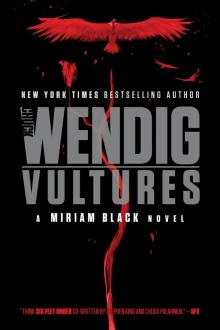 Vultures
Vultures Mockingbird
Mockingbird Wanderers
Wanderers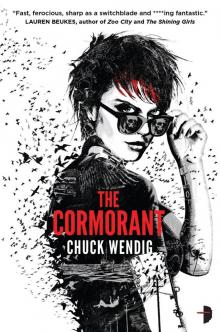 The Cormorant
The Cormorant Empire's End: Aftermath (Star Wars)
Empire's End: Aftermath (Star Wars)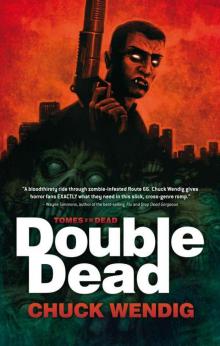 Double Dead
Double Dead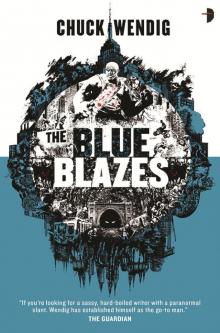 The Blue Blazes
The Blue Blazes 250 Things You Should Know About Writing
250 Things You Should Know About Writing Irregular Creatures
Irregular Creatures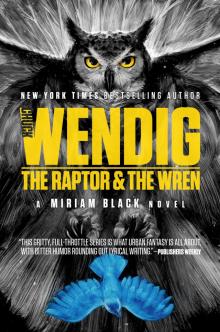 The Raptor & the Wren
The Raptor & the Wren Aftermath: Star Wars
Aftermath: Star Wars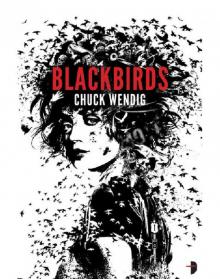 Blackbirds
Blackbirds The Hunt
The Hunt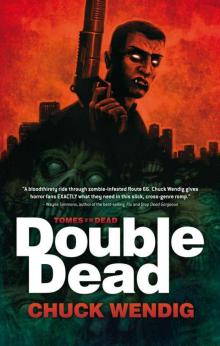 Tomes of the Dead (Book 1): Double Dead
Tomes of the Dead (Book 1): Double Dead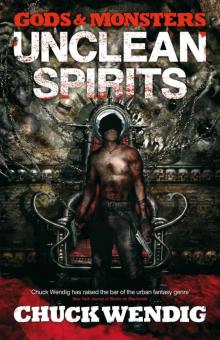 Gods and Monsters: Unclean Spirits
Gods and Monsters: Unclean Spirits The Harvest
The Harvest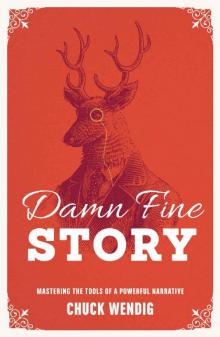 Damn Fine Story: Mastering the Tools of a Powerful Narrative
Damn Fine Story: Mastering the Tools of a Powerful Narrative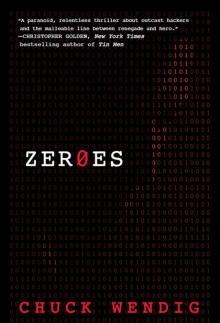 ZerOes
ZerOes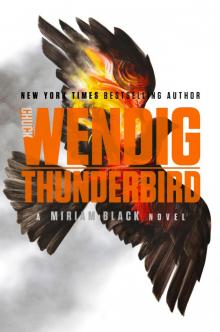 Thunderbird
Thunderbird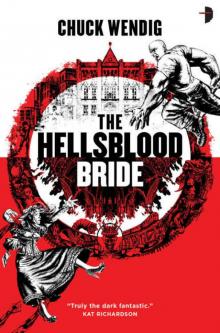 The Hellsblood Bride
The Hellsblood Bride Double Dead: Bad Blood
Double Dead: Bad Blood Life Debt
Life Debt